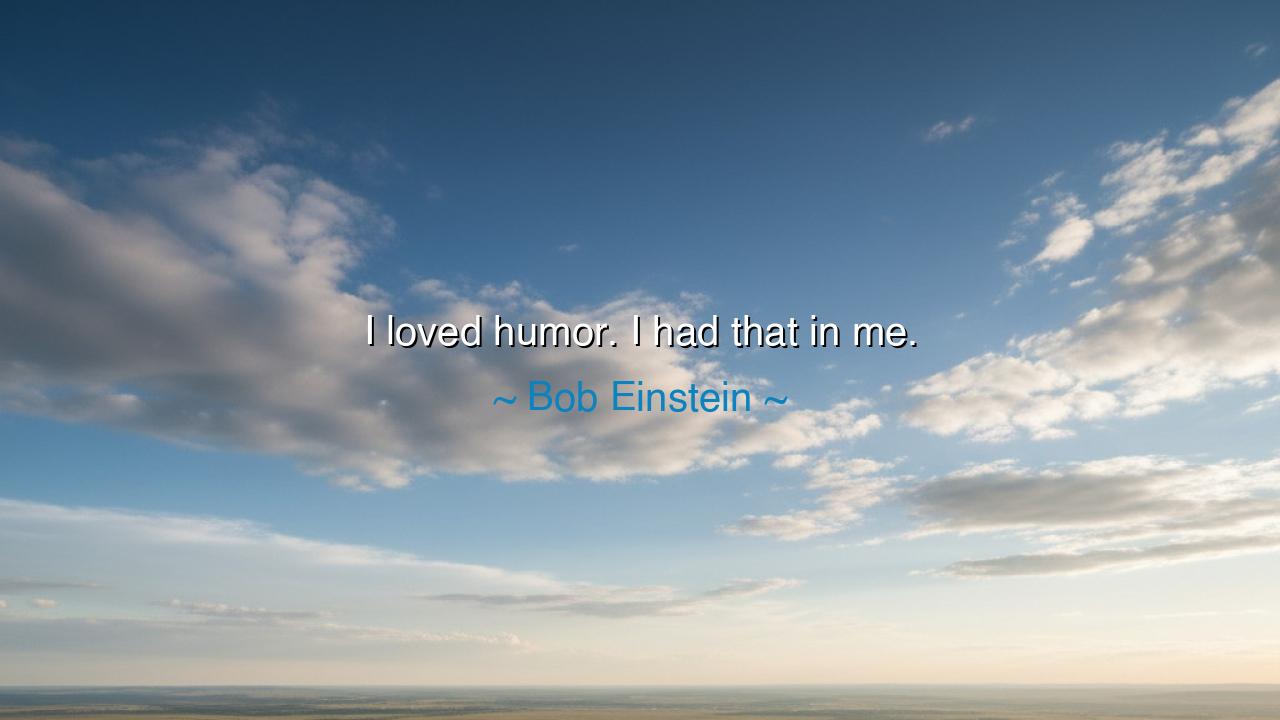
I loved humor. I had that in me.






Hear me now, O seekers of wisdom, for in the words of Bob Einstein, there is a truth that reaches deep into the heart of the human soul: “I loved humor. I had that in me.” These simple words reveal not just a love for laughter, but the essence of humor itself—a force that flows through the heart and mind, shaping how we see the world and how we connect with others. Humor, like a mighty river, cuts through the rocky terrain of life's hardships, leaving in its wake a smoother path to understanding, joy, and truth. To say, "I had that in me," is to acknowledge that humor is not merely a talent or a skill; it is a gift woven into the very fabric of our being.
What, then, is the true meaning of Bob Einstein’s words? Humor is not something that is taught or acquired. It is an inherent part of who we are, an expression of our spirit, a lightness that rises from within, often in the most unexpected moments. It is a reflection of how we choose to see the world—not as a place of despair, but as a place of possibility, a place where joy can be found even in the darkest of times. In this sense, humor is a wisdom passed down through the ages, a tool given to us by the gods to help navigate the trials of life.
Let us turn our gaze to the ancient Greeks, who understood the transformative power of humor in ways that still echo today. The great playwrights of Athens—Aristophanes, in particular—used humor to challenge the powers of the time. His comedies were not merely for entertainment; they were sharp critiques of society, of politics, and of the very nature of human existence. Humor was, to the Greeks, a way of shining a light on the absurdities of life, allowing the people to laugh at their own failings while also revealing truths too painful to confront directly. Just as Bob Einstein spoke of humor as something that "was in him," so too did the Greeks recognize that humor is an intrinsic force, one that allows us to see the world through a lens of understanding rather than judgment.
The Romans too understood the deep power of humor. The philosopher Seneca, in his writings, often employed wit and irony to teach profound lessons about human nature. He believed that laughter, when used wisely, could be a form of medicine for the soul, a way of lifting the weight of sorrow and showing the futility of excessive pride. It was not that humor denied suffering, but rather that it allowed one to face suffering with courage, with grace, and with a heart willing to learn. Bob Einstein’s declaration that humor was something he loved and carried within him speaks to this ancient understanding—that humor is both a gift and a responsibility, one that can change not only the individual but also the world around them.
In reflecting upon this, consider the story of King Solomon, whose wisdom was said to be as vast as the oceans. Though he was a king, Solomon understood the value of laughter. It was said that his court was filled with mirth and lightness, for he knew that humor was not only a balm for the soul but a means of teaching. Through stories, riddles, and laughter, he shared his deepest insights with his people. Like Bob Einstein, Solomon recognized that humor could touch hearts in ways that words alone could not. Humor, in all its forms, has the power to break down barriers, to open minds, and to heal wounds.
Now, O seekers of truth, I call upon you to reflect on the nature of humor in your own lives. What is it that makes you laugh? What is it that causes your soul to lighten, to rise above the weight of daily life? Is it a deep love for others, a playful spirit, or perhaps an ironic sense of the world’s contradictions? Know that humor is a gift—one that resides in all of us, waiting to be awakened. It is a tool that can bring clarity, joy, and wisdom to our lives, a way to see the world not just as it is, but as it could be.
Take, then, the wisdom of Bob Einstein to heart. Recognize the humor that lies within you, and allow it to shape your journey. Whether through laughter, wit, or irony, use your humor to bring light into the world. When times are hard, let it be your shield; when the road is unclear, let it be your guide. Just as the ancients understood the power of laughter, so too must you use humor to lift others and yourself, to face life’s struggles with grace and joy, and to see the deeper truths hidden within the laughter itself.






AAdministratorAdministrator
Welcome, honored guests. Please leave a comment, we will respond soon